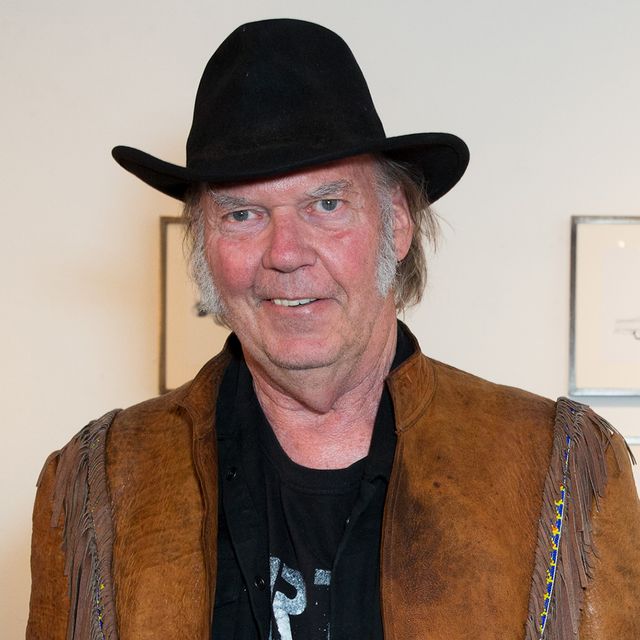Neil Young Declares War on Corporate Giants: “Forget Amazon and Whole Foods — Save America by Buying Local”
In a stunning and deeply personal statement, legendary musician Neil Young has once again proven that his convictions run deeper than fame, money, or convenience. The 79-year-old singer-songwriter announced that he will remove his entire catalog from Amazon Music, urging his fans to follow him in rejecting corporate giants that, in his words, “have sold out America.”
“Bezos supports this government. It does not support you or me,” Young declared in a post that quickly ignited debate across social media. “Forget Amazon and Whole Foods. Forget Facebook. It is easy to buy local. Support your community. Go to the local store. Don’t go back to the big corporations who have sold out America.”
Young’s statement, fiery and poetic in equal measure, struck a chord with many who have long admired his outspoken activism. But this time, his words carry a sharper edge — not just as a call to consciousness, but as a plea for cultural survival.

A Stand Against the “Corporate Control Age”
For decades, Neil Young has stood apart from the music industry’s corporate machinery, championing artistic integrity and independence over commercial trends. From his battles with record labels in the 1980s to his more recent feud with Spotify over misinformation, Young has always put principle before profit.
But his latest move, targeting Amazon, goes beyond music. It is a direct strike against what he calls “The Corporate Control Age.”
“We all have to give up something to save America from the Corporate Control Age it is entering,” he wrote. “They need you to buy from them. Don’t.”
Those words reflect not only frustration but also an urgent warning — that America’s cultural and economic soul is being eroded by convenience and dependency. In his view, massive corporations like Amazon have replaced community stores, fractured local economies, and fostered a generation of passive consumers who no longer know their neighbors or where their products come from.
From Protest Songs to Personal Sacrifice
For Neil Young, music has always been political. “Ohio,” “Rockin’ in the Free World,” and “The Monsanto Years” all serve as testaments to his lifelong crusade for truth and justice through art. But his decision to remove his music from one of the world’s largest streaming platforms is not merely symbolic — it’s a financial sacrifice.

Amazon Music provides access to millions of listeners worldwide. Removing his songs means fewer streams, fewer royalties, and potentially fewer new fans discovering his music. Yet, Young seems unfazed. His message is clear: integrity outweighs exposure.
“Music isn’t meant to serve billionaires,” wrote one fan in response to his announcement. “It’s meant to serve people.”
That sentiment mirrors the musician’s own beliefs — that art, like commerce, should reconnect with humanity and purpose.
A Challenge to Listeners
Young’s announcement comes at a time when the convenience economy has never been stronger. From groceries to gadgets, a single click can summon anything to your doorstep. For many, that convenience is not a luxury — it’s survival in a fast-paced world.
Yet Young’s challenge asks something radical of his audience: to step away from the digital comfort zone and return to physical community life.
“Support your community. Go to the local store,” he wrote. “Don’t go back to the big corporations.”
To some, it sounds nostalgic. To others, idealistic. But for Young, it’s a moral necessity — a call to remember that democracy and capitalism were never meant to serve monopolies.
The Cultural Shockwave
Neil Young’s move has sparked both praise and criticism. Supporters hail him as a rare voice of moral courage in a profit-obsessed industry. Detractors, however, accuse him of hypocrisy — noting that his music has long been distributed through major labels that also rely on corporate infrastructure.

But even critics admit: few artists of his generation still take public stands this bold.
Social media quickly erupted with the hashtag #ShopLocalWithNeil, as fans shared stories of supporting neighborhood markets, local record shops, and independent businesses. Some even posted photos of themselves buying vinyl copies of Young’s albums — a fitting tribute to his analog roots and his vision of a more human-centered America.
Beyond Protest — A Movement
Neil Young’s stand against Amazon may not dismantle corporate empires overnight. But it reflects a growing unease among artists, consumers, and citizens about the invisible cost of convenience. As global giants tighten their grip on every corner of daily life — from food to media to healthcare — the line between service and control grows dangerously thin.
By pulling his music, Young is forcing fans to confront that reality. He is reminding them — and perhaps himself — that freedom is not just a political ideal, but an economic choice made every time we click “Buy Now.”
The Final Word
Neil Young has never been one to whisper his truth. Whether on stage or on the page, his voice carries the grit of a man who refuses to surrender to apathy. His message, though controversial, rings with authenticity in an era dominated by algorithms and ad revenue:
“They need you to buy from them. Don’t.”
It’s not just a boycott — it’s a call to arms for an America that remembers its roots.
And as Neil Young steps away from Amazon’s digital shelves, he reminds us all that real change doesn’t come from comfort — it comes from courage.